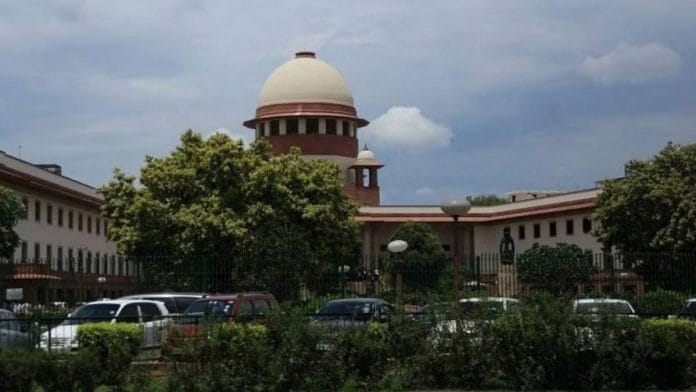New Delhi: A person who is not arrested during the anti-money laundering probe, but is named in the final complaint filed by the Enforcement Directorate (ED), cannot be arrested by the agency without the court’s permission, the Supreme Court ruled Thursday.
A bench led by Justice Abhay S. Oka cleared the air on powers of ED officers in situations where the agency files a complaint against a person without arresting him/her and the special court takes cognisance of it.
Custody of such person can be sought from the court before which the complaint is filed. This court, the bench said, can allow the ED’s request, but has to furnish detailed reasons for the same.
The SC also said that once the person — not arrested till the time the ED filed its complaint — appeared before the special court in response to the summons issued, he/she could not be considered in custody and need not seek bail. Hence, there is no need for the person to satisfy the stringent twin test for bail under Section 45 of the Prevention of Money Laundering Act (PMLA).
Section 45 requires a court to provide the public prosecutor an opportunity to oppose the bail application of the accused. It also states that the court can release the accused only if satisfied that there are reasonable grounds for believing that he/she is not guilty of the offence and that he/she is not likely to commit any offence while on bail. These conditions make it difficult for a money laundering accused to get bail.
The ED derives its power to arrest a person who it believes is involved in an act of money laundering under Section 19 of the PMLA. The agency claimed in the SC that court taking cognisance of its complaint did not subsume the agency’s power to arrest, vested in it under Section 19.
“After cognisance is taken of the offence punishable under Section 4 of the PMLA based on a complaint under Section 44, the ED and its officers are powerless to exercise powers under Section 19 to arrest the person shown as accused in the complaint,” the SC observed in the judgement.
In case the ED wants custody of the accused who appears after service of summons for conducting further investigation, the agency has to file an application before the special court, the SC said.
The judgement added that after hearing the accused, the special court must pass an order on the application after recording brief reasons. The court may permit custody only if it is satisfied that custodial interrogation of the accused is required even though he/she was never arrested in the past during the probe.
However, in case the ED wants to arrest someone who is not shown as an accused in the complaint, it can do so provided it fulfils the requirements of the law that includes informing the person about the grounds of his/her arrest.
The court said that once a complaint is filed under the PMLA, the special court shall be governed by the Code of Criminal Procedure (CrPC). Therefore, the special court can direct appearance of the accused only upon issuance of summons.
If the accused does not respond to the summons, then the court should first issue bailable warrants, followed by non-bailable ones.
An accused who appears in response to the summons cannot be treated as if he/she is in custody. Therefore, the twin bail conditions mandated under the PMLA need not be met to release the person on bail and the court can direct the accused to furnish bonds in terms of the CrPC.
(Edited by Nida Fatima Siddiqui)
Also Read: PMLA conditions not a ‘fetter’ preventing courts from granting bail, says SC






